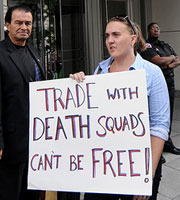NATIONAL
Trade pact ‘puts commercial interests over workers’
 The following is crossposted from AFL-CIO Now:
The following is crossposted from AFL-CIO Now:
The announcement by the White House this afternoon that Colombia has successfully implemented key elements of the Labor Action Plan and that the U.S.–Colombia Free Trade Agreement (FTA) will enter into force on May 15 “is deeply disappointing and troubling,” says AFL-CIO President Richard Trumka.
Leaders of national labor organizations in Colombia joined Trumka in opposing today’s announcement, saying:
[T]he underlying trade agreement perpetuates a destructive economic model that expands the rights and privileges of big business and multinational corporations at the expense of workers, consumers, and the environment. The agreement uses a model that has historically benefited a small minority of business interests, while leaving workers, families, and communities behind.
In April 2011, the U.S. and Colombia agreed to an Action Plan on Labor Rights intended to “protect internationally recognized labor rights, prevent violence against labor leaders, and prosecute the perpetrators of such violence” in Colombia. Although the Action Plan includes some measures that Colombian unions and the AFL-CIO have been demanding for years, its scope was too limited: it resolved neither the grave violations of union freedoms or human rights.
Some two dozen Colombian trade union leaders were killed last year alone, and an AFL-CIO report released last fall found that the Action Plan, which was billed as a major step to ending violence against trade unionists and protecting the right of workers to come together in unions “has failed to achieve improvements on the ground for Colombia’s working families.”
In the joint statement, Trumka, CUT President Luís Miguel Morantes and CTC President Tarcisio Mora Godoy, said:
We have been monitoring the progress of the Action Plan and conclude that, although new laws and directives are in place, the Government of Colombia has not yet demonstrated successful implementation. Workers across the whole economy continue to be forced into indirect employment relationships — preventing them from exercising their rights to free association and collective bargaining — because the Government has not completely lived up to its promises regarding cooperatives” and other employment relationships that affect labor rights. Nor has the Government of Colombia compiled a successful record of criminal prosecutions of employers who illegally interfere with workers’ fundamental rights. Labor activists and other human rights defenders remain subject to threats and violence, including murder, when they stand up to fight for their rights.
The announcement came during the Summit of the Americas in Colombia, where President Barack Obama has been meeting regional political and business leaders.
In a separate statement, Trumka put it bluntly:
We regret that the administration has placed commercial interests above the interests of workers and their trade unions.
U.S. and Colombian union leaders say that rather than moving to implement the FTA, leaders in both countries should move toward a new trade model that creates jobs, boosts economic development and increases standards of living in both countries.
We must work together to delete the provisions that imperil worker rights and freedoms as well as public interest regulations. Instead, we should add provisions to ensure stronger worker protections, a healthy environment, safe food and products, and the ability to regulate financial and other markets to avoid crises like that of 2008.





